2015年春八年级英语下册 Unit 2 I`ll help to clean the city parks导学案
- 格式:doc
- 大小:165.50 KB
- 文档页数:8
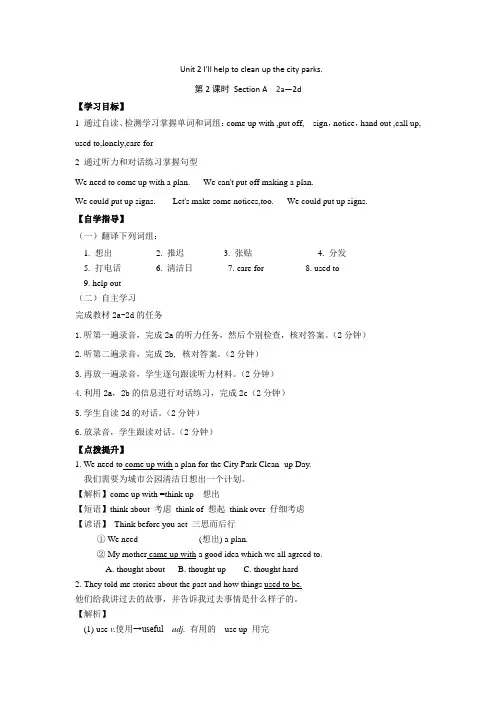
Unit 2 I'll help to clean up the city parks.第2课时Section A 2a—2d【学习目标】1 通过自读、检测学习掌握单词和词组:come up with ,put off, sign,notice,hand out ,call up, used to,lonely,care for2 通过听力和对话练习掌握句型We need to come up with a plan. We can't put off making a plan.We could put up signs. Let's make some notices,too. We could put up signs.【自学指导】(一)翻译下列词组:1. 想出__________2. 推迟_________3. 张贴_______________4. 分发______________5. 打电话________6. 清洁日________7. care for _________8. used to______________9. help out_____________(二)自主学习完成教材2a-2d的任务1.听第一遍录音,完成2a的听力任务,然后个别检查,核对答案。
(2分钟)2.听第二遍录音,完成2b, 核对答案。
(2分钟)3.再放一遍录音,学生逐句跟读听力材料。
(2分钟)4.利用2a,2b的信息进行对话练习,完成2c(2分钟)5.学生自读2d的对话。
(2分钟)6.放录音,学生跟读对话。
(2分钟)【点拨提升】1. We need to come up with a plan for the City Park Clean -up Day.我们需要为城市公园清洁日想出一个计划。
【解析】come up with =think up 想出【短语】think about 考虑think of 想起think over 仔细考虑【谚语】Think before you act 三思而后行① We need______________(想出) a plan.② My mother came up with a good idea which we all agreed to.A.thought aboutB. thought upC. thought hard2.They told me stories about the past and how things used to be.他们给我讲过去的故事,并告诉我过去事情是什么样子的。
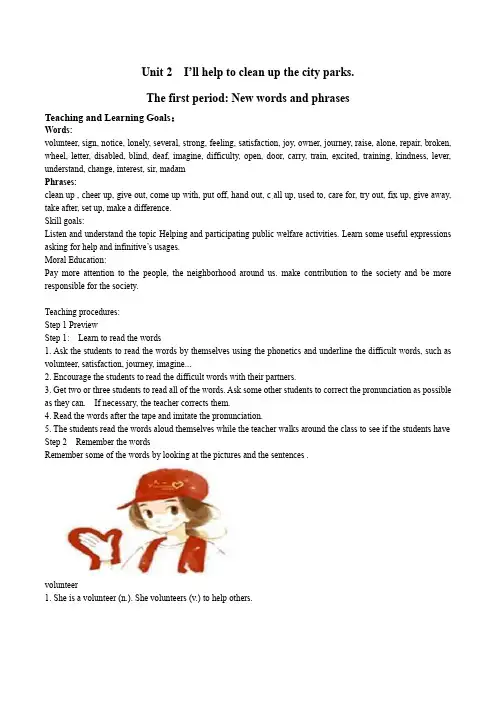
Unit 2 I’ll help to clean up the city parks.The first period: New words and phrasesTeaching and Learning Goals:Words:volunteer, sign, notice, lonely, several, strong, feeling, satisfaction, joy, owner, journey, raise, alone, repair, broken, wheel, letter, disabled, blind, deaf, imagine, difficulty, open, door, carry, train, excited, training, kindness, lever, understand, change, interest, sir, madamPhrases:clean up , cheer up, give out, come up with, put off, hand out, c all up, used to, care for, try out, fix up, give away, take after, set up, make a difference.Skill goals:Listen and understand the topic Helping and participating public welfare activities. Learn some useful expressions asking for help and infinitive’s usages.Moral Education:Pay more attention to the people, the neighborhood around us. make contribution to the society and be more responsible for the society.Teaching procedures:Step 1 PreviewStep 1:Learn to read the words1. Ask the students to read the words by themselves using the phonetics and underline the difficult words, such as volunteer, satisfaction, journey, imagine...2. Encourage the students to read the difficult words with their partners.3. Get two or three students to read all of the words. Ask some other students to correct the pronunciation as possible as they can. If necessary, the teacher corrects them.4. Read the words after the tape and imitate the pronunciation.5. The students read the words aloud themselves while the teacher walks around the class to see if the students have Step 2 Remember the wordsRemember some of the words by looking at the pictures and the sentences .volunteer1. She is a volunteer (n.). She volunteers (v.) to help others.sign2. Look at the sign. It says: No smoking!notice3. I notice (v.) a new notice (n.) on the wall .journey4. They are having a long journey.wheel5. A bike has two wheels.letter6. This is a thank-you letter.blind deafHelen Keller is a blind and deaf woman . But she is very great.open door7. She is opening the door.B. Remember some of the words by conversion (转换), derivative(派生)and similar meaning. 1.转换①I want to be a volunteer. (名词) I volunteer to help the old. (动词)②I notice (动词) a new notice (名词.) on the wall③Great changes (名词)have taken place in Zaozhuang.Thanks for changing (动词)my life.④The beautiful pictures interest(动词)me. My brother has many interests(名词)and hobbi es.2. 派生①feeling 感觉,感触:feel( 感觉)+ing②satisfaction 满足,满意:satisfy(使高兴)去y +action③owner 物主,主人:own(自己的)+er④disabled 残疾的:dis+ able(有能力的) +d⑤difficulty 困难:difficult(困难的) +y⑥excited 激动的:excite(使激动) +d⑦kindness 仁慈,善良:kind(和蔼的) +ness3.近义词或近义短语①several: a few, some②joy: happiness③lonely: alone④repair: fix up⑤take after: look like⑥clever: smart⑦care for: look after; take care of⑧call up: telephone⑨give out: han d outC. Remember the phase by matching Column A with Column B.A B1. clean up 振奋起来2. cheer up 建立3. set up 打扫干净4. give away 赠送5. put off 参加…选拔6.try out 推迟e up with 曾经ed to 影响9.make a difference 想出,提出Step 3 Consolidate the words and phrases1. Ask the students to read the words and phrases and their Chinese of Unit 1 o n Page 116 and Page117. Cover the English words and phrases , look at the Chinese and say the English for them. Write down the words they haven’t g rasped.Groups MarksBOYSGIRLSStep 4 Read and translate1. Ask the students to read the passage and tra nslate it into Chinese.Jim is a clever boy with kindness. He takes after his father. He likes volu nteering and caring for others.He used to help to clean up the city parks and raise money for the children who were sick or poor. When he saw those children get better or the look of joy on their faces, he had a strong feeling of satisfaction.Now he comes up with a new idea. He gives outsome notices and calls up friends to collect old or broken bikes for himHe now has sixteen bikes to fix up and gives away to children who don’t have bikes.Step 5: Mind mapGet the students to remember the words.2. Get the students to retell the passage according to the mind map.Step 6: Class test一、根据句意和首字母完成单词。
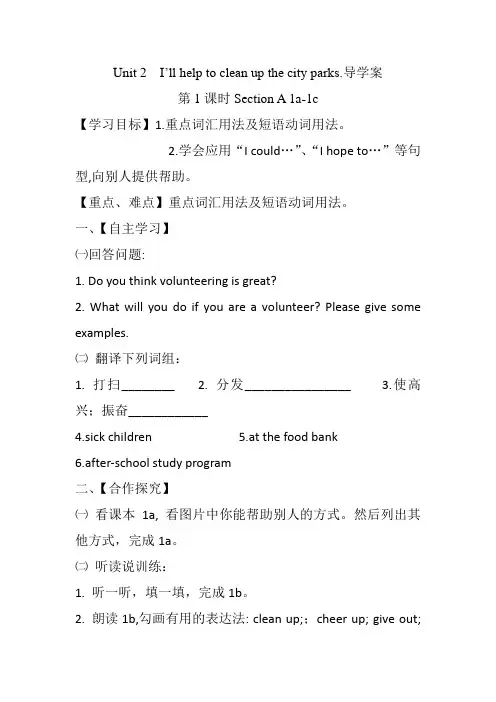
Unit 2 I’ll help to clean up the city parks.导学案 第1课时Section A 1a-1c 【学习目标】1.重点词汇用法及短语动词用法。 2.学会应用“I could…”、“I hope to…”等句型,向别人提供帮助。 【重点、难点】重点词汇用法及短语动词用法。 一、【自主学习】 ㈠回答问题: 1. Do you think volunteering is great? 2. What will you do if you are a volunteer? Please give some examples. ㈡ 翻译下列词组: 1. 打扫________ 2. 分发________________ 3.使高兴;振奋____________ 4.sick children 5.at the food bank 6.after-school study program 二、【合作探究】 ㈠ 看课本1a, 看图片中你能帮助别人的方式。然后列出其他方式,完成1a。 ㈡ 听读说训练: 1. 听一听,填一填,完成1b。 2. 朗读1b,勾画有用的表达法: clean up;;cheer up; give out; at the food bank 3. 练习上面图片中的对话,然后使用1b中的信息编写对话,完成1c。 (三)语言学习 1. You could help to clean up the city parks. 1)help作动词,“帮助”。help sb.to do sth.意为:______________. 如:He often helps me to study English. 2)help作名词,“帮助”。如:______________________. 谢谢你的帮助。 3) clean 可用作形容词,意为“清洁的,干净的”,此外clean 可用作动词,用于以下词组:clean up 打扫清洁或收拾整齐,整理。clean out 打扫某物内部(如:房间,抽屉,箱子等) clean-up (名词)打扫,清洁。 练一练:It’s time for you to _________________ your bedroom. I will help you _____________ the school. Tomorrow is _____day, everyone should try to do some cleaning. 2. sick和ill的用法区别 sick是形容词,"生病的",同义词是ill。区别在于sick在句中可做 语和____ 语,而ill只能做 语。如:His father was /sick yesterday, so he didn't go to work.他的父亲昨天病了,因此他没有去上班。Tom has looked after the sick girl for a week. 汤姆照顾那个生病的小女孩已经一星期了。当ill意为"坏的,恶劣的"时,在句中可做定语。如:He is an ill child.他是一个坏孩子。 三、【达标检测】 用所给词的适当形式填空。 1. Let’s cheer _________ (they)up, ok? 2. I’d like _____________ (visit)my English teacher tomorrow. 3. I’ll feel good about _______ (help)the old people. 4. He _____(spend) every morning _______ (do)some sports. 5. They plan ___________ (buy) a big house. 四、【课后反思】
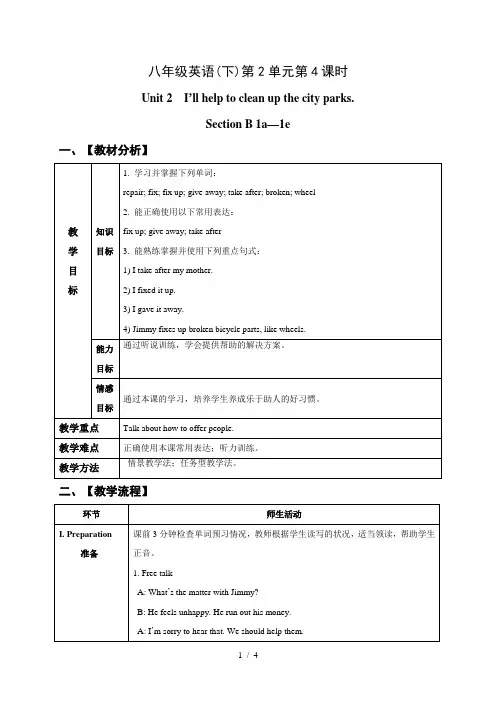
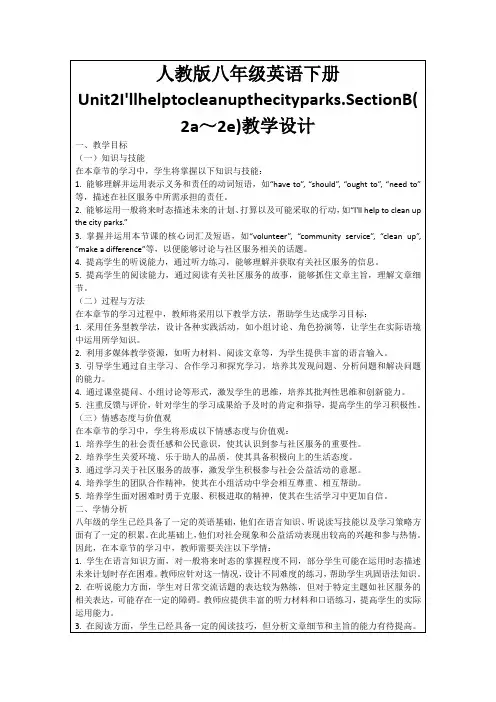
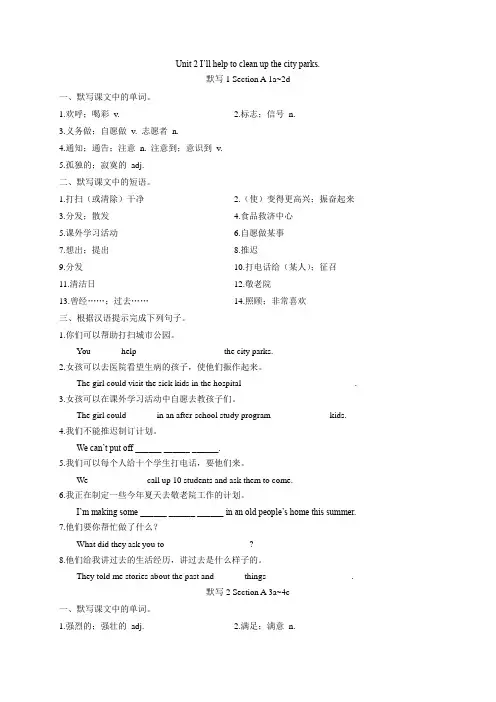
Unit 2 I’ll help to clean up the city parks.默写1 Section A 1a~2d一、默写课文中的单词。
1.欢呼;喝彩v. ____________________2.标志;信号n. ____________________3.义务做;自愿做v. 志愿者n. ____________________________________________________4.通知;通告;注意n. 注意到;意识到v. __________________________________________5.孤独的;寂寞的adj. ____________________________________________________________二、默写课文中的短语。
1.打扫(或清除)干净______________2.(使)变得更高兴;振奋起来______________3.分发;散发______________________4.食品救济中心_________________________5.课外学习活动____________________6.自愿做某事___________________________7.想出;提出______________________8.推迟_________________________________9.分发____________________________ 10.打电话给(某人);征召_________________ 11.清洁日_________________________ 12.敬老院______________________________13.曾经……;过去……_____________ 14.照顾;非常喜欢_______________________三、根据汉语提示完成下列句子。
1.你们可以帮助打扫城市公园。
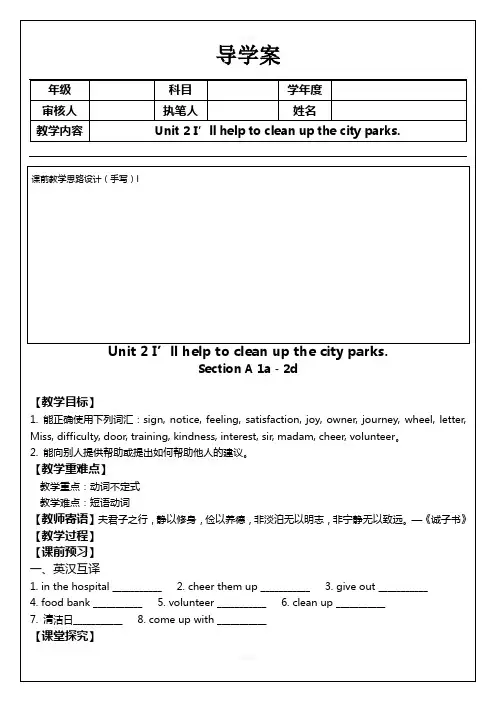
精品文档 随意编辑 导学案
年级 科目 学年度 审核人 执笔人 姓名 教学内容 Unit 2 I’ll help to clean up the city parks.
Unit 2 I’ll help to clean up the city parks. Section A 1a - 2d
【教学目标】 1. 能正确使用下列词汇:sign, notice, feeling, satisfaction, joy, owner, journey, wheel, letter, Miss, difficulty, door, training, kindness, interest, sir, madam, cheer, volunteer。 2. 能向别人提供帮助或提出如何帮助他人的建议。 【教学重难点】
教学重点:动词不定式 教学难点:短语动词 【教师寄语】夫君子之行,静以修身,俭以养德,非淡泊无以明志,非宁静无以致远。—《诚子书》 【教学过程】 【课前预习】 一、英汉互译 1. in the hospital ___________ 2. cheer them up ___________ 3. give out ___________ 4. food bank ___________ 5. volunteer ___________ 6. clean up ___________ 7. 清洁日___________ 8. come up with ___________ 【课堂探究】
课前教学思路设计(手写)l 精品文档 随意编辑 1. They told me stories about
the past and how things used to be. 他们给我讲过去的故事以及事情曾经的样子。 【解析】used to 意为“曾经……;过去……”,属于情态动词的范畴,后面跟动词原形,表示过去的习惯动作或状态,现在已不再发生或不存在。 例:Tom used to be cinema here. 译为:_____________________________________ 拓展:used to的各种句式 肯定句:主语+used to do… 否定句:主语+used not to/usedn’t to/didn’t use to do… 疑问句:“Did+主语+use to do…”或“Used+主语+to do…?” 2. Yeah, a lot of old people are lonely. 译为 ___________________________________ 【解析】lonely是形容词,意为______________________。 【课后作业】
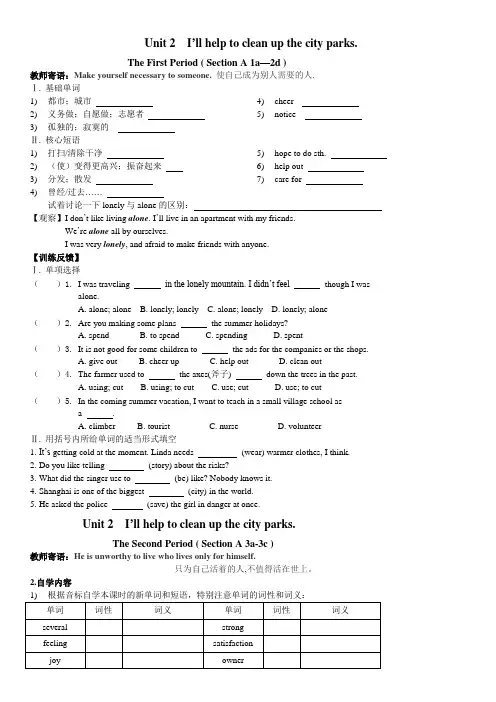
Unit 2I’ll help to clean up the city parks.The First Period ( Section A 1a—2d )教师寄语:Make yourself necessary to someone.使自己成为别人需要的人.Ⅰ. 基础单词1)都市;城市2)义务做;自愿做;志愿者3)孤独的;寂寞的4)cheer5)noticeⅡ. 核心短语1)打扫/清除干净2)(使)变得更高兴;振奋起来3)分发;散发4)曾经/过去……5)hope to do sth.6)help out7)care for试着讨论一下lonely与alone的区别:【观察】I don’t like living alone. I’ll live in an apartment with my friends.We’re alone all by ourselves.I was very lonely, and afraid to make friends with anyone.【训练反馈】Ⅰ. 单项选择()1. I was traveling in the lonely mountain. I didn’t feel though I was alone.A. alone; aloneB. lonely; lonelyC. alone; lonelyD. lonely; alone ()2. Are you making some plans the summer holidays?A. spendB. to spendC. spendingD. spent()3. It is not good for some children to the ads for the companies or the shops.A. give outB. cheer upC. help outD. clean out()4. The farmer used to the axes(斧子) down the trees in the past.A. using; cutB. using; to cutC. use; cutD. use; to cut()5. In the coming summer vacation, I want to teach in a small village school asa .A. climberB. touristC. nurseD. volunteerⅡ. 用括号内所给单词的适当形式填空1.It’s getting cold at the moment. Linda needs (wear) warmer clothes, I think.2.Do you like telling (story) about the risks?3.What did the singer use to (be) like? Nobody knows it.4.Shanghai is one of the biggest (city) in the world.5.He asked the police (save) the girl in danger at once.Unit 2I’ll help to clean up the city parks.The Second Period ( Section A 3a-3c )教师寄语:He is unworthy to live who lives only for himself.只为自己活着的人,不值得活在世上。
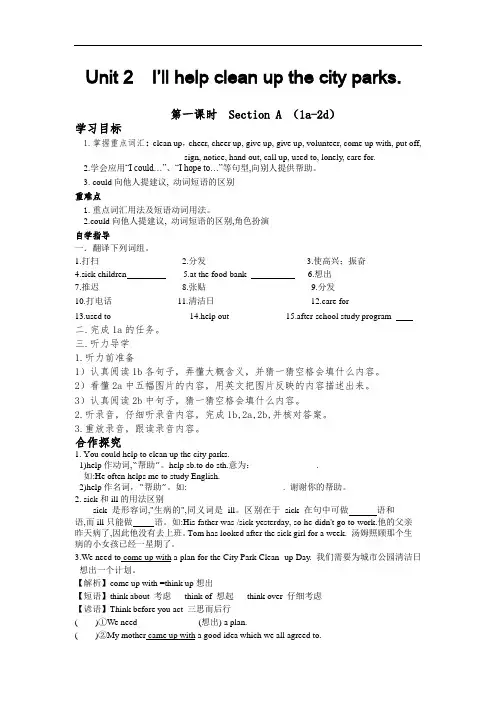
Unit 2 I’ll help clean up the city parks.第一课时 Section A (1a-2d)学习目标1.掌握重点词汇:clean up,cheer, cheer up, give up, give up, volunteer, come up with, put off,sign, notice, hand out, call up, used to, lonely, care for.2.学会应用“I could…”、“I hope to…”等句型,向别人提供帮助。
3. could向他人提建议, 动词短语的区别重难点1.重点词汇用法及短语动词用法。
2.could向他人提建议, 动词短语的区别,角色扮演自学指导一.翻译下列词组。
1.打扫________2.分发________________3.使高兴;振奋____________4.sick children5.at the food bank6.想出_______7.推迟______ 8.张贴__________________ 9.分发____________10.打电话___________ 11.清洁日________________ 12.care for ______________ed to______________ 14.help out_____________15.after-school study program二.完成1a的任务。
三.听力导学1.听力前准备1)认真阅读1b各句子,弄懂大概含义,并猜一猜空格会填什么内容。
2)看懂2a中五幅图片的内容,用英文把图片反映的内容描述出来。
3)认真阅读2b中句子,猜一猜空格会填什么内容。
2.听录音,仔细听录音内容,完成1b,2a,2b,并核对答案。
3.重放录音,跟读录音内容。
合作探究1. You could help to clean up the city parks.1)help作动词,“帮助”。
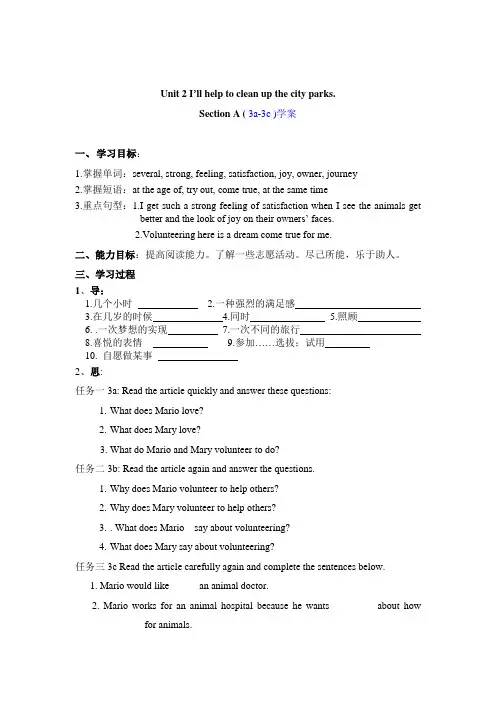
Unit 2 I’ll help to clean up the city parks.Section A ( 3a-3c )学案一、学习目标:1.掌握单词:several, strong, feeling, satisfaction, joy, owner, journey2.掌握短语:at the age of, try out, come true, at the same time3.重点句型:1.I get such a strong feeling of satisfaction when I see the animals getbetter and the look of joy on their owners’ faces.2.Volunteering here is a dream come true for me.二、能力目标:提高阅读能力。
了解一些志愿活动。
尽己所能,乐于助人。
三、学习过程1、导:1.几个小时2.一种强烈的满足感3.在几岁的时候4.同时5.照顾6. .一次梦想的实现7.一次不同的旅行8.喜悦的表情9.参加……选拔;试用10. 自愿做某事2、思:任务一3a: Read the article quickly and answer these questions:1.What does Mario love?2.What does Mary love?3. What do Mario and Mary volunteer to do?任务二3b: Read the article again and answer the questions.1.Why does Mario volunteer to help others?2.Why does Mary volunteer to help others?3.. What does Mario say about volunteering?4.What does Mary say about volunteering?任务三3c Read the article carefully again and complete the sentences below.1. Mario would like _____ an animal doctor.2. Mario works for an animal hospital because he wants ________ about how_______ for animals.3. Mary decided ________ for a job at an after-school reading program last year.She still works there now _______ kids learn to read.4. Mary has a dream job because she can do what she loves ____________.3、议:小组核对答案。
Unit 2 I’ll help to clean up the city parks. Section A (1a-2d) 学习目标 1. 学习P9—10的生词:clean up,cheer, cheer up, give up, give up, volunteer, come up with, put off, sign, notice, hand out, call up, used to, lonely, care for . 2.学会应用“I could„”、“I hope to„”等句型,向别人提供帮助。 3. could向他人提建议, 动词短语的区别 学习重难点 1.重点词汇用法及短语动词用法。 2.could向他人提建议, 动词短语的区别,角色扮演 学 习 过 程 一、预习与交流 ㈠尝试回答下列问题: 1. Do you think volunteering is great? __________________________________________ 2. What will you do if you are a volunteer? Please give some examples. __________________________________________ ㈡ 翻译下列词组: 1. 打扫________ 2. 分发________________ 3.使高兴;振奋____________ 4.sick children 5.at the food bank 6.想出_______ 7.推迟______ 8.张贴__________________ 9.分发____________ 10.打电话___________ 11.清洁日________________ 12.care for ______________ 13.used to______________ 14.help out_____________ 15.after-school study program 二、合作与探究 1. 看课本1a, 看图片中你能帮助别人的方式。然后列出其他方式,完成1a。 2. 听一听,填一填,完成1b。 2. 朗读1b,勾画有用的表达法: clean up;;cheer up; give out; at the food bank 3. 练习上面图片中的对话,然后使用1b中的信息编写对话,完成1c。 4.一群学生正在策划一个城市公园清洁日。听录音,并勾出他们为告诉人们关于城市清洁日要做的事,完成2a。 5.朗读2b中的句子,再听一遍录音,并填空,完成2b。 6.用2a和2b中的信息编写对话,完成2c。 7.分角色表演对话,勾画出其中的重点短语,完成2d。 三、点拨升华 1. You could help to clean up the city parks. 1)help作动词,“帮助”。help sb.to do sth.意为:______________. 如:He often helps me to study English. 2)help作名词,“帮助”。如:______________________. 谢谢你的帮助。 2. sick和ill的用法区别 sick是形容词,"生病的",同义词是ill。区别在于sick在句中可做 语和____ 语,而ill只能做 语。如:His father was /sick yesterday, so he didn't go to work.他的父亲昨天病了,因此他没有去上班。Tom has looked after the sick girl for a week. 汤姆照顾那个生病的小女孩已经一星期了。 1. We need to come up with a plan for the City Park Clean -up Day. 我们需要为城市公园清洁日想出一个计划。 【解析】come up with =think up 想出 【短语】:think about 考虑 think of 想起 think over 仔细考虑 【谚语】 Think before you act 三思而后行 ( ) ①We need______________(想出) a plan. ( )②My mother came up with a good idea which we all agreed to. A. thought about B. thought up C. thought hard 2. They told me stories about the past and how things used to be. 他们给我讲过去的故事,并告诉我过去事情是什么样子的。 【解析】 (1) use v.使用→useful adj. 有用的 use up 用完 Studying English is__________(use). (2) use sth to do sth 用某物做某事 We use Internet __________(find) information. (3) used to do sth 过去常常做某事,表示过去做过的事现在已经不做,只用于过去时态。 ①My mother used_________(tell)us story when we were young. ( ) ②He used to ____short and ____ short hair when he was young. A. have; be B. be; have C. be; be D. have; have (4) be /get used to doing sth 习惯于做某事 My grandpa is used ___________(live) in country. (5) be used to do sth 被用来做某事=be used for doing sth ①Stamps is used ____________(post) letters. 【记】 He used to wear glasses . But now he is used to wearing contact lenses. 他以前常戴(框架)眼镜,但现在习惯戴隐形眼镜。 3.Yeah, a lot of old people are lonely. 是的,很多老年人都很孤独。 【解析】alone / lonely 辨析: (1)alone = by oneself adj. 单独的,指无人陪伴的客观事实,不带感情色彩。 He often walks alone to home . (2)lonely ①指人孤独的,寂寞的,强调主观感受;②也可指某个地方是荒凉的 ( ) ①The old man lives ___,but he never feels ____. A. alone ;lonely B. lonely; alone C. alone; alone D. lonely; lonely ( ) ②My little sister is afraid to stay at home alone. A. quietly B. lonely C. all the time D. by herself ( ) ③ He did the work all by himself. A. already B. together C. alone D. lonely 四、课堂练习 用所给词的适当形式填空。 1. Let’s cheer _________ (they)up, ok? 2. I’d like _____________ (visit)my English teacher tomorrow. 3. I’ll feel good about _______ (help)the old people. 4. He _____(spend) every morning _______ (do)some sports. 5. They plan ___________ (buy) a big house. 五 总结反思 ________________________________________________________________________ ________________________________________________________________________
Unit 2 I’ll help to clean up the city parks.(第二课时) Section A 3a- 4c 组别: 姓名: 学习目标 1. 学习P11—12的生词: 2.理解短文大意,把握细节。 3. 非谓语动词 (动词不定式做宾语、宾语补足语、目的状语)的用法 学习重难点 非谓语动词 (动词不定式做宾语、宾语补足语、目的状语)的用法 学 习 过 程 一、预习与交流 (一)翻译下列词组: 1.放弃______ 2.动物医院___________ 3.关心__________________ 4.实现__________ 5.at the age of four________________ 6.try out for _________ 7.after-school reading program _____________ 8.张贴_____________ 9.分发_______________ 10.打电话____________ 11.使振奋____________ 12.想出______________ 13.捐赠 ______________ 14.推迟 ____________ 15.闲暇时间_________ 16.考虑______________17.制定计划___________ 18.无家可归的人__________19.停止做某事__________ (二)自读、小组内互读单词和词组。 二、合作与探究 1. 读3a的文章。回答下列问题,完成3a&3b。 (1)What do Mario and Mary volunteer to do? _____________________________________________ (2)Why do Mario and Mary volunteer to help others? _____________________________________________ (3)What do they say about volunteering? _____________________________________________ 2. 细读文章,完成以下表格。 Who When Where What do they do? Mario Mary 3.再读文章,勾画出其中的重点短语。 4.用动词不定式填空,完成3c。 5.小组内大声朗读Grammar Focus的对话。 6.独立完成4a,4b,4c,并且核对答案。 7.试着背诵记忆Grammar Focus,4a,4b,4c,部分的内容。 三、点拨升华 1. Mario Green and Mary Brown from Riverside High School give up several hours each week to help others. 来自河畔高中的马里奥.格林和玛丽.布朗每周都会花几个小时去帮助别人。 【解析1】give up 放弃 give up doing sth=stop doing sth 放弃做某事 ( ) I find it too difficult to learn English well. I want to drop it. A. give up it B. give it up C. give away it D. give it away 2.But I want to learn more about how to care for animals. 【解析】care for 照看;照顾; 照料 Many students in our school _______ the old and they usually offer their seats to them on buses.